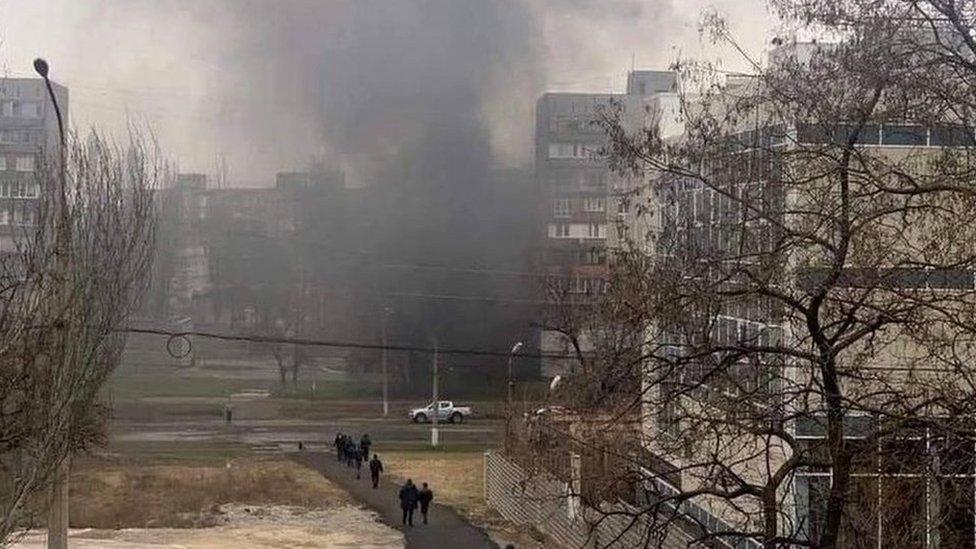'It is Russia against humanity': Crisis grows in besieged Ukrainian city
- Published
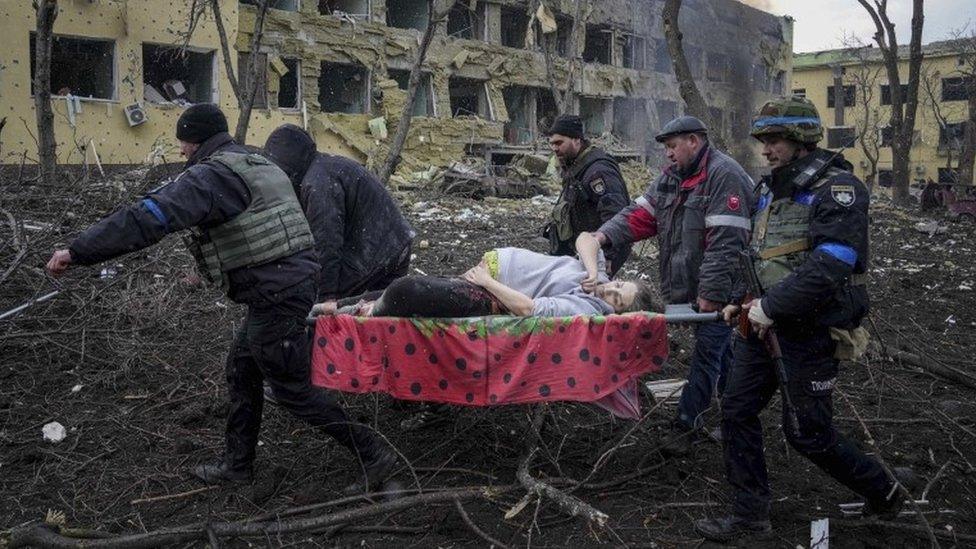
Ukrainian emergency services carry an injured pregnant woman from a hospital shelled by Russian forces
People with loved ones trapped inside the besieged city of Mariupol were trying desperately on Thursday to connect to phones inside the city, which has been virtually cut off from the outside world by an escalating and indiscriminate bombing campaign by Russian forces.
Dmytro Gurin, a Ukrainian MP who grew up in Mariupol and whose parents are trapped there, said he last managed to connect to their neighbours four days ago.
"We spoke for 30 seconds after they went to a spot with signal - there are a couple of these spots people know about," Mr Gurin said.
"They said my parents were alive, living in the basement under their apartment building.
"Please understand me that this is not a shelter with light, water and a toilet, it is a basement with nothing."
Mr Gurin said his parents were using snow to drink water and trying to cook food on an open fire outside.
"Can you try to imagine this? Your parents, 67 and 69, are drinking snow and trying to cook on a fire outside in winter and there is continuous shelling," he said.
"This is not war any more. This is not army against army. It is carpet bombing. It is Russia against humanity."
Arthur Bondarenko, a 35-year-old coffee distributor in Odessa, said he was hopelessly sending messages every day to his close friends, a couple with a six-year-old son.
"Every day I message them and say, 'Hello, good morning, how are you?'
"None of the messages go through."
Mr Bondarenko said he last spoke to them on 2 March.
"They had no water, no electricity, no heating and there was no shelter under their house."

Mariupol, a city of about 400,000, is a key strategic target for Russia because seizing it would allow Russian-backed rebels in eastern Ukraine to join forces with troops in Crimea, the southern peninsula annexed by Russia in 2014.
The city has now been subjected to nine days of heavy bombardment by Russian forces, destroying apartment buildings and flattening residential areas. Footage verified by the BBC showed shelling on Thursday, confirming a statement by the city council that the bombardment was ongoing.
Dmytro Kuleba, Ukraine's foreign minister, said on Thursday that the situation in Mariupol was the most difficult in the country.
On Wednesday, three people - two adults and a girl - were killed in Mariupol and 17 were wounded in a devastating strike that destroyed a maternity ward and children's ward of a hospital.
Diana Berg, a Mariupol resident who managed to escape with her husband on Friday, said she learned of the strike via the news.
"Yesterday was the most brutal, shocking thing," she said. "That hospital is very close to where I lived, I was there a week before, my family doctor is there. I don't know if he is still alive," Ms Berg said.
Ms Berg has also been unable to reach her mother-in-law since Saturday, and has no idea if she is alive or dead.
"She got one message through the day after we left to say she was alive and she knew we were still alive," Ms Berg said. "Since then we know nothing. We use the Telegram app, we watch the media, that's it."
Municipal authorities have finally been able to begin collecting and burying bodies which had been in the streets, the deputy mayor Serhiy Orlov told the BBC on Thursday. City officials estimated 1,300 civilians had been killed so far, Mr Orlov said.
"There is no possibility of private graves, because of the high numbers and because of the continuous shelling. They are being put into mass graves," he said.
Ms Berg said the news of the mass graves had spread through the Telegram chat groups people are using to monitor the situation inside the city.
"We have no news from our friends, all we know is they could be buried in those mass graves," she said.
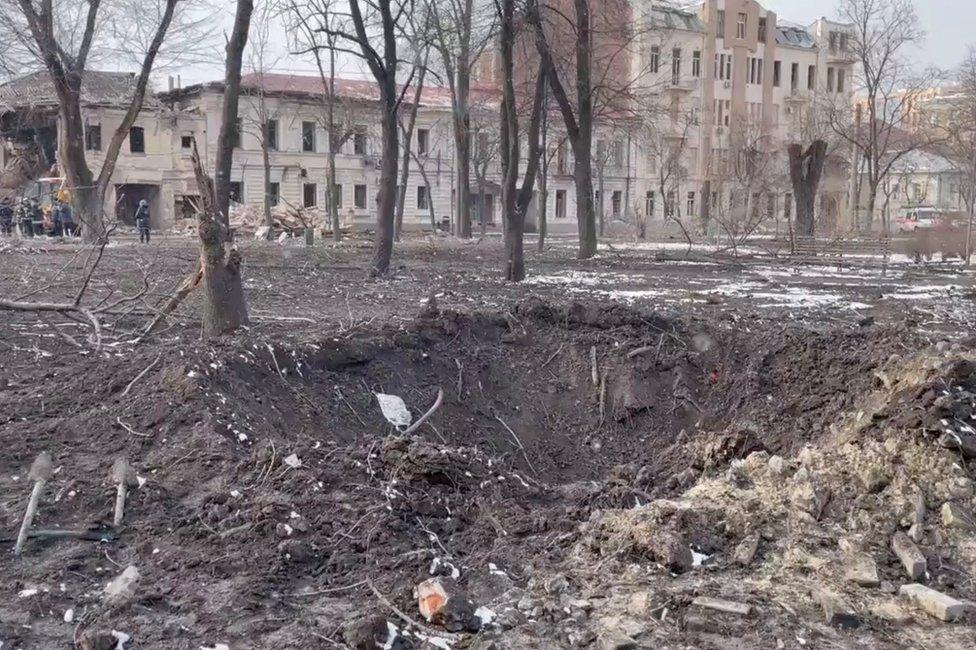
Russia has also heavily shelled the eastern city of Kharkiv and other major cities
Numerous planned evacuation attempts for Mariupol residents have collapsed over the past five days after Russian forces have resumed shelling the city, despite ceasefire agreements. Mr Orlov said city officials were ready at any moment to put evacuation plans into place but no agreement could be reached with Russia on establishing a humanitarian corridor.
Mr Orlov said that a group of 100 citizens attempted to leave Mariupol on Thursday by private car and passed a Ukrainian checkpoint but were forced back when Russian forces fired close to the cars, blocking their path.
Mr Orlov's own parents and brother were still trapped inside a heavily shelled Mariupol neighbourhood, he said, and he had not been able to reach them for nine days.
There are growing fears now of a serious humanitarian crisis inside Mariupol, following widespread reports that people were trying to take water from snow and had no access to food or medicines.
Oleksandr Protyah, a 43-year-old English teacher, said his mother and close friend were trapped inside the city and his friend may have run out of medication for her diabetes.
"I managed to arrange insulin for her on the first day of the war but she has either run out or will run out soon," he said. "This is a humanitarian catastrophe."
There would also soon be a food crisis, said Mr Gurin, the MP.
"The next thing will be the hunger," he said "This is not a joke, in a week you will have famine in the centre of Europe."
Responding to the strike on the Mariupol hospital on Wednesday, the mayor of Mariupol, Vadym Boychenko, accused Russian forces of a "total evil that has no explanation".
"How can this be justified?" he said. "This is a genocide organised by Russia against our people."
Russia claimed on Thursday that the maternity ward destroyed in the attack had been taken over by Ukrainian troops long before it was hit, but images from the scene captured by the Associated Press news agency showed medical staff outside after the blast and a pregnant woman being carried out of the building in a stretcher.
"Thank god most of the people there were in the bomb shelter already," Mr Orlov, the deputy mayor said. "Otherwise it would have been much worse."
Ukrainian President Volodymyr Zelensky called the strike an "atrocity" and reiterated his call for world powers to enforce a no-fly zone over Ukraine - a request that has so far been denied.
The foreign minister, Mr Kuleba said on Thursday that his Russian counterpart Sergey Lavrov had told Ukrainian officials Russia would continue its aggression until Ukraine met all its demands, including surrender.
Svitlana Libet contributed to this report.

War in Ukraine: More coverage
OCCUPIED CITY: 'We are not co-operating'
RUSSIA MOTHERS: 'How do I get my soldier son back?'
EXPLAINED: Why Putin has invaded Ukraine?
IN DEPTH: Full coverage of the conflict

Related topics
- Published10 March 2022
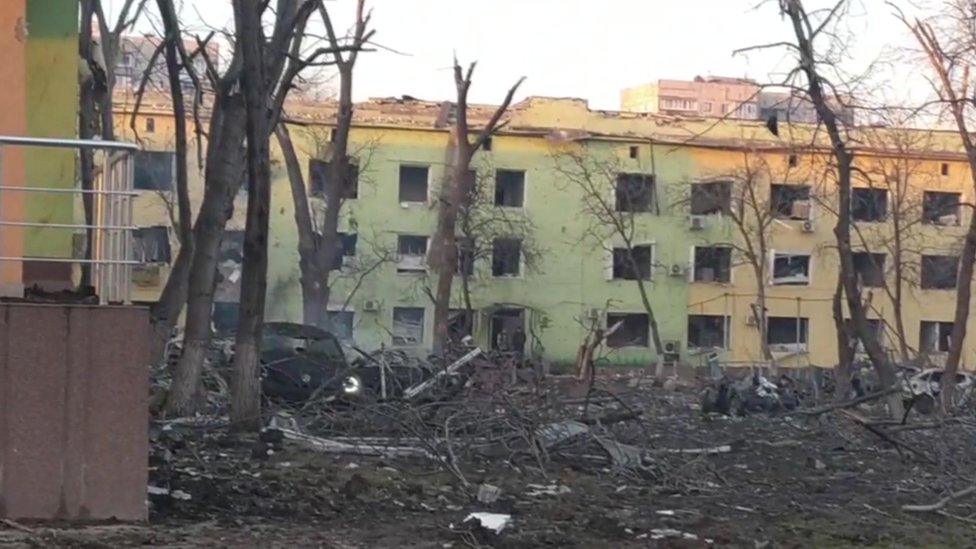
- Published6 March 2022
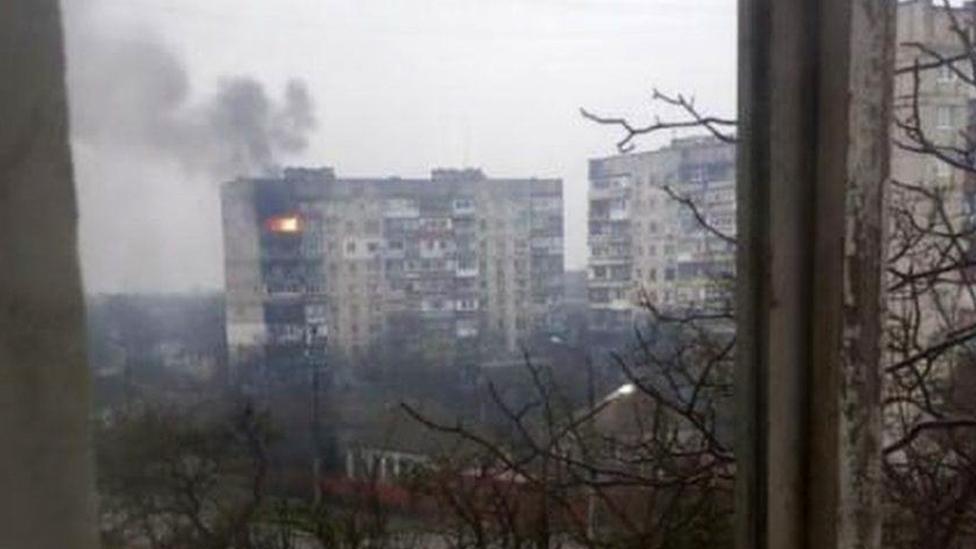
- Published5 March 2022
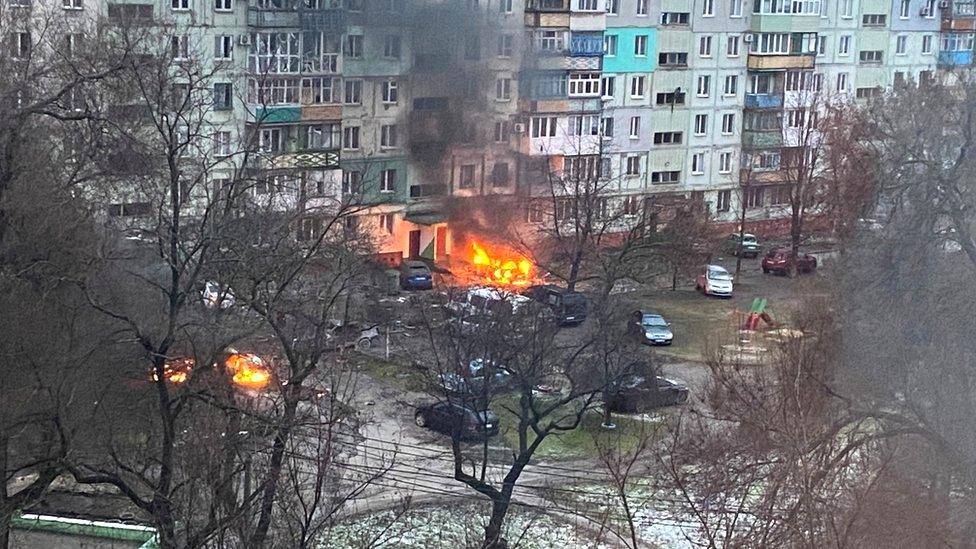
- Published3 March 2022
